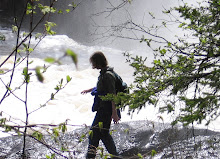Okay--the garage is painted! Also, the leaves are raked and tucked around the shrubs like warm blankets, our first snow is falling in gentle fat flakes, and just outside my window our first sukkah stands bare and empty but not forgotten. It is yet a reminder of recent reminiscing, family fun, and God's graceful provision. In case you are wondering what a sukkah is, this is my "very last first time" at placing an image in a blog:

Oh good!--it worked! Still hard to tell what a sukkah is, though?! A sukkah is a tent--a temporary dwelling, like the Israelites lived in during the years they wandered in the wilderness. As God directs it to be constructed, it is a basic, four-sided frame covered with fabric walls and a roof made of four different kinds of tree branches--something like evergreen, deciduous, flowered/fruiting, and flexible (like willow). Our walls--long swaths of purple and blue fabrics I've used for many purposes over the years--are not pictured because we only hung them when we were actually in the sukkah. Our sukkah happens to be "furnished" with benches we made several years ago when a beaver took down one of the largest remaining popple (aspen) trees next to our swamp (he only wanted the leafy branches); but furnishings are not a significant element of a sukkah.
As the subject of biblical holidays has come up in conversation this year, a lot of our listeners have equated them with "Jewish" holidays, but this is a misnomer. Biblical holidays are the feasts and special days God told His people to keep long before there were such things as "Jews" and Jewish customs, rabbis, rabbinical law, tabernacles, or temples. The special days and feasts are delineated in Exodus 20, Leviticus 23, and Deuteronomy 16, when the Lord was beginning to form the Hebrew people into a nation. The holidays are also mentioned in various other places in both the Old and New Testaments. They are celebrations pregnant with purpose, reminding all celebrants of God's credibility and capability as evidenced by His faithful hand on His people in the past. Thus, many Jews (a relatively modern term most widely used to mean "people whose traditional religion is Judaism, and who trace their origins through the ancient Hebrew people of Israel to Abraham") do celebrate these holidays according to customs they've established through tradition, but the roots of "biblical holidays" are pre-Judaism; likewise, many "Jewish" customs and holidays are not found in the Bible, and we are not studying those.
God's appointed feasts also foreshadow the arrival and work of the Messiah. Many Jews are still waiting for a messiah (savior) that meets their expectations, but since we accept Christ as the Messiah, who was born Immanuel (God with us) and sacrificed Himself to redeem us from our debts, we've enjoyed learning how He fulfilled the Messianic intents of the biblical holidays. Christ, in fact, gives the holidays even richer significance.
I know we didn't keep the letter of the Law (for instance, we never quite got our "lulavs" together to wave...), but I think we discovered and embraced the spirit of it. For us, God's appointed time for the Feast of Booths was perfect timing. We were thankful not only to set aside some pleasant days for celebration, but also feasted on rich, nourishing lessons for ourselves and our children. We savored the reminder, permission, and time to reflect. We enjoyed the extra time outdoors in the fall weather. We warmed ourselves at the fire, admired the stars, and imagined the arrival of Immanuel in circumstances in which many scholars believe He was actually born. And we dwelt expectantly on the future, studying about the time when Christ will gather us as a groom gathers his bride, to establish us in our permanent home!
Since we also had time to finish preparing for winter, I have a little more time for blogging again!
Thank You, Lord!


















No comments:
Post a Comment